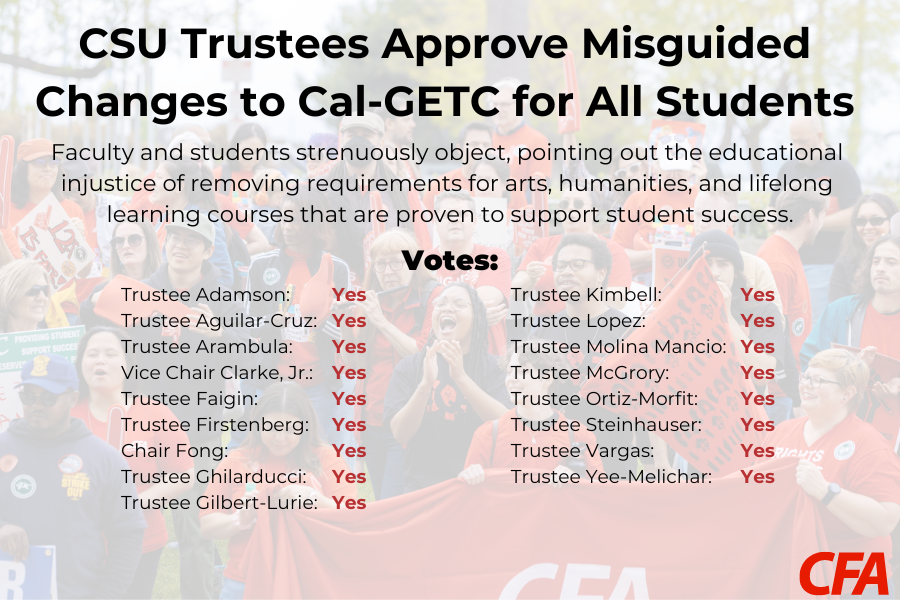CSU Trustees Approve Misguided Changes to Cal-GETC for All Students
At their meetings this week, CSU Trustees unanimously approved Title V changes that would impose General Education changes developed for transfer students on all CSU students.
They did so over the strenuous objections of faculty and students who pointed out the educational injustice of removing requirements for arts, humanities, and lifelong learning courses.
San José State Lecturer Eric Johnson spoke during public comment at Tuesday’s trustees meeting. Johnson urged against taking away such integral resources for students.

“I say please press pause before gutting these two GE requirements for the students. Area E courses and Self Development are proven to improve the success of first-gen students and are especially relevant to those students right now given all the concerns about how the pandemic affected their personal and social development and college readiness,” said Johnson, also a CFA San José member. “And Area C Humanity courses: I have watched students gain passions and aptitudes” and work on research projects “that opened new worlds of opportunity to them in fields like media production, public health, and other work. Believe me, these students benefit from these courses, and the cultural sector needs more of our students.”
Trustees ignored evidence showing that student success – especially for students of color – comes from the very support programs they voted to cut.
Known as The California General Education Transfer Curriculum (Cal-GETC), imposing the changes on non-transfer students removes one Arts and Humanities class and the Lifelong Learning and Self-Development course General Education requirements. Doing so discourages students from enrolling in important classes designed to help them succeed. For example, Lifelong Learning courses can play a major role in supporting students from historically marginalized communities.
CFA Associate Vice President, South, and CSU San Marcos Professor Michelle Ramos Pellicia pointed to the social justice ramifications of imposing Cal-GETC on non-transfer students.
“This proposal will have profound curricular impacts to first year programs, the Arts and Humanities discouraging students from exploring different disciplines and harming their success. Twenty-one of our 23 CSU campuses are Hispanic Serving Institutions with students who are Spanish-heritage speakers. Exposure to our heritage language, is instrumental as it is the exposure to languages and cultures other than English-speaking experiences. Expanding Cal-GETC erodes those possibilities,” Ramos Pellicia told trustees during public comment Tuesday. “The curricular changes will also negatively impact our lecturer faculty and our viability as a language department. The omission and reduction of classes are only the first steps to our possible demise.
“As a Puerto Rican woman scholar of color, I can’t remain silent while I see the CSU underserving an increasingly Black and brown student population when they will be paying so much more for a watered-down education.”
Opposition to extending the Cal-GETC changes to non-transfers came from many corners of the CSU – even the chair of the CSU’s General Education Advisory Committee and the Cal-GETC Special Committee on Standards.
“Both the faculty and the students support the transfer pattern required by law and the associated Title V changes at this time. Both the faculty and the students ask for a rigorous faculty-led data-informed decision to change CSU GE in the future. Let me be crystal clear: neither the faculty nor students want to change CSU GE at this time and reject the associated Title V changes at this time. That is 29,000 faculty and over 450,000 students that don’t want to change it at this time,” Eniko Csomay, chair of the two committees, CFA San Diego member, and San Diego State Professor, told trustees during Tuesday’s public comment. “I don’t believe it looks good on anybody’s record that showed that you voted against the will of the people. At this time, vote no on Title V changes pertinent to CSU GE.”
CSU faculty are justifiably proud of their success in meeting the CSU’s mission to empower our students to succeed in their education and careers. Skills courses help recruit and retain students from diverse and rural communities, where many K-12 schools have experienced decades of disinvestment and under-resourcing due to systems of racism, colonialism, racial capitalism, and environmental injustice. It’s why many who identify as Native and Indigenous students or Black students struggle at CSU campuses without the support provided by skills courses, mentoring, tutoring, resource centers, and mental health counseling.
Students and faculty have been firmly opposing the application of Cal-GETC to all students, noting its harmful impact on educational quality and students of color.
Extending Cal-GETC to all incoming students is a misguided attempt by CSU management to increase graduation rates. Such a move sacrifices genuine and well-documented practices for student education on the altar of metrics. It ultimately results in the exploitation of students and faculty and compromises the CSU’s educational mission.
Join California Faculty Association
Join thousands of instructional faculty, librarians, counselors, and coaches to protect academic freedom, faculty rights, safe workplaces, higher education, student learning, and fight for racial and social justice.